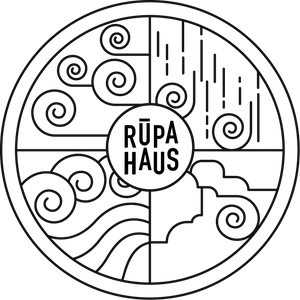Composed by Vivien Huynh
You’re most likely attuned to the nature of sustainable clothing by now – especially if you’ve changed the course of your purchase behaviour into conscious buying. But how much do you know about ethical consumption besides nurturing the part of you that feels good for saying no to fast fashion? Who and what exactly benefits from your choices?
At RŪPAHAUS, we encourage all who choose conscious to choose active thought. To not only take part in making the world a more inhabitable place, but to understand how their actions ultimately help heal the planet. Because we care that you care. Where your money goes, we most certainly believe you deserve to know. After all, it’s got to account for something.


There's something about transparency that transpires us to think about how things work. The clockwork inside our heads go, "I'm aware of how I consume, now it's time to think about where what I consume comes from" – it's a truly beautiful process because we're finally allowing ourselves to become aware. We know that in order to continue thriving, we have to recognise what needs to be done for that to happen.
Your ethical consumption matters to us because it changes the course of the world. It alters lives that are connected to us through the threads we place upon our bodies. These threads come from the very hands of those who piece your garment together, to those who carefully package and ensure it is received by you.
RŪPAHAUS considers each aspect of ethical consumption to go beyond the idea of slow fashion. It’s right down to the people involved, how they benefit, and how our actions provide a 360 impact on those involved from the beginning. We’re talking about our artisans in rural Indonesia. We’re talking about the aid and development of these very small communities who are imperative to the growth of the local economy. We’re talking, once again, about understanding where our clothes come from – along with the outpour of dedication that consummates the garment you wear on your morning coffee runs.
What you don’t find elsewhere is a business’s capability to play truth or dare. Many entities of a business will be afraid to go down the chain of execution with you. What happens with the item you purchase in between – from the time it’s made to when it’s dispatched can be a blur (intentionally). It may seem that some places prefer to not provide those details. Some places prefer to not be transparent and honest about their production processes.
But here’s the way we see it. There's essentially no problem with lack of disclosure if the receiver isn’t asking the tough questions. We have just as much responsibility to seek answers for ourselves, much the same as it is a business’s corporate responsibility to let us know these things.
RŪPAHAUS is stringent on our ability to control our own supply chain from start to finish. It means responsible and careful production, working with native ingredients that are local to Indonesia and collaborating directly with artisans to streamline the process. It’s about breaking the stigma that quality doesn’t need to be sacrificed in exchange for the betterment of the environment.
We’re gradually bridging the gap between eco-luxury and the dependency on fast fashion.

Years of mass consumerism has led to larger production chains to meet heavy demands around the globe. But if we just stopped for a brief moment and slowed down, perhaps many traditions wouldn’t be so lost today. All that we do circles back to why we do it. The conscious effort from us and the actions by you ensures that everyone benefits, and it means we get to continue doing good by everyone. Our primary focus the past few years has been to empower these artisan communities to keep preserving their traditional crafts - in hopes that, perhaps, a new generation will come along and continue the preservation.
Every piece of clothing or homeware item you purchase from RŪPAHAUS will always be invested back into the communities in which they were made. It brings us back a step in reassessing our consumption habits, but it also propels us forward in making just a little difference each time. Our definitive measure of impact isn’t about how fast you adopt sustainable fashion, but how much you understand the process of it.
Ethical clothing is no longer a trend, it’s an entire lifestyle change.


